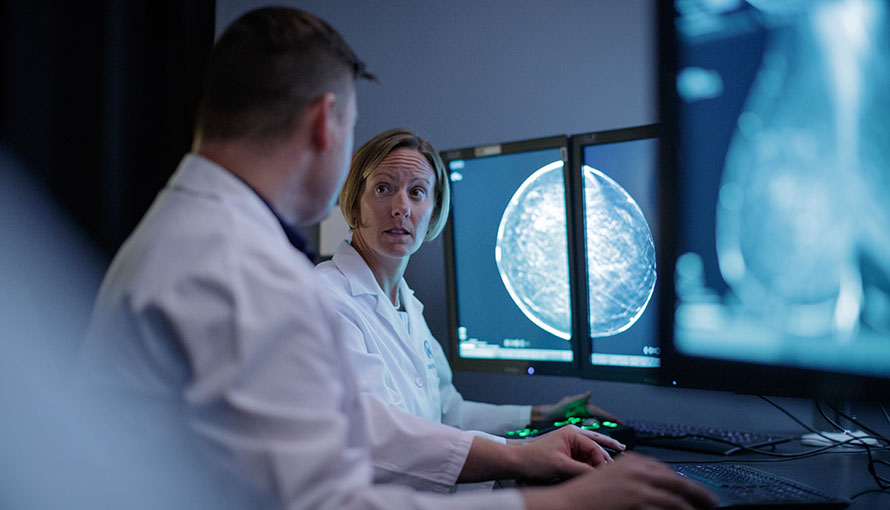The Use of Radiomics in Breast Imaging May Result in Improved Patient Outcomes
 Precision medicine—an innovative method focused on personalizing disease prevention and treatment—requires noninvasive biomarkers to stratify and guide personalized therapy. The field of radiomics involves the extraction of quantitative data from standard-of-care medical imaging and is poised to be an important non-invasive tool in guiding personalized treatment in cancer care.
Precision medicine—an innovative method focused on personalizing disease prevention and treatment—requires noninvasive biomarkers to stratify and guide personalized therapy. The field of radiomics involves the extraction of quantitative data from standard-of-care medical imaging and is poised to be an important non-invasive tool in guiding personalized treatment in cancer care.
Moffitt Cancer Center is a national leader in the field of radiomics with multiple experts leading trials utilizing quantitative imaging biomarkers to assist in stratifying disease, personalizing treatment and predicting response to therapy. Studies at Moffitt applying radiomics in breast cancer care include:
- Utilization of radiomic habitat imaging to quantify heterogeneity in perfusion of invasive cancers at breast MRI and predict response to therapy. Results show that quantified perfusional heterogeneity on breast MRI can predict pathologic complete response in breast cancer patients receiving neoadjuvant therapy. Specifically, tumors with worse outcomes have been found to contain larger poorly perfused imaging habitat volumes and larger volumes of poorly perfused imaging habitats that interact with the peri-tumoral parenchyma.
- Utilization of radiomic features extracted from ductal carcinoma in-situ (DCIS) lesions to assist in disease stratification and personalized treatment. DCIS is a heterogeneous group of neoplastic lesions confined to the lumens of breast ducts and typically detected by screening mammography. Approximately 15-25% of DCIS lesions will be upgraded to invasive carcinoma at surgical excision, while another subset of DCIS lesions may be indolent and never progress to an invasive malignancy within a woman’s lifetime. A current R01 NCI/NIH grant at Moffitt is enrolling patients with a focus on identifying radiomic and pathomic biomarkers to assist in classifying DCIS lesions as low-risk versus high-risk of upgrade to invasive malignancy. Accurate stratification of DCIS lesions would allow for safe de-escalation of aggressive treatments in patients with low-risk DCIS and appropriate surgical management in patients with DCIS at high-risk for upgrade to an invasive malignancy. Preliminary data has shown promise in predicting DCIS upgrade when radiomic features from the whole lesion and surrounding peri-tumoral voxels are extracted.

In addition to the cutting-edge work in the breast cancer radiomic space, Moffitt provides breast cancer risk assessments for every patient receiving a screening mammogram. This service provides patients with a personalized estimated lifetime risk of developing breast cancer and allows for the identification of high-risk women who would benefit from supplemental screening. Moffitt also provides cutting-edge supplemental screening options for average-risk women via the abbreviated breast MRI (AB-MRI) program. Data show that AB-MRI increases the detection of invasive breast cancers in average and intermediate-risk women compared to mammography alone.
If you’d like to refer a patient to Moffitt Cancer Center, complete our online form or contact a physician liaison for assistance. As part of our efforts to shorten referral times as much as possible, online referrals are typically responded to within 24 - 48 hours.
